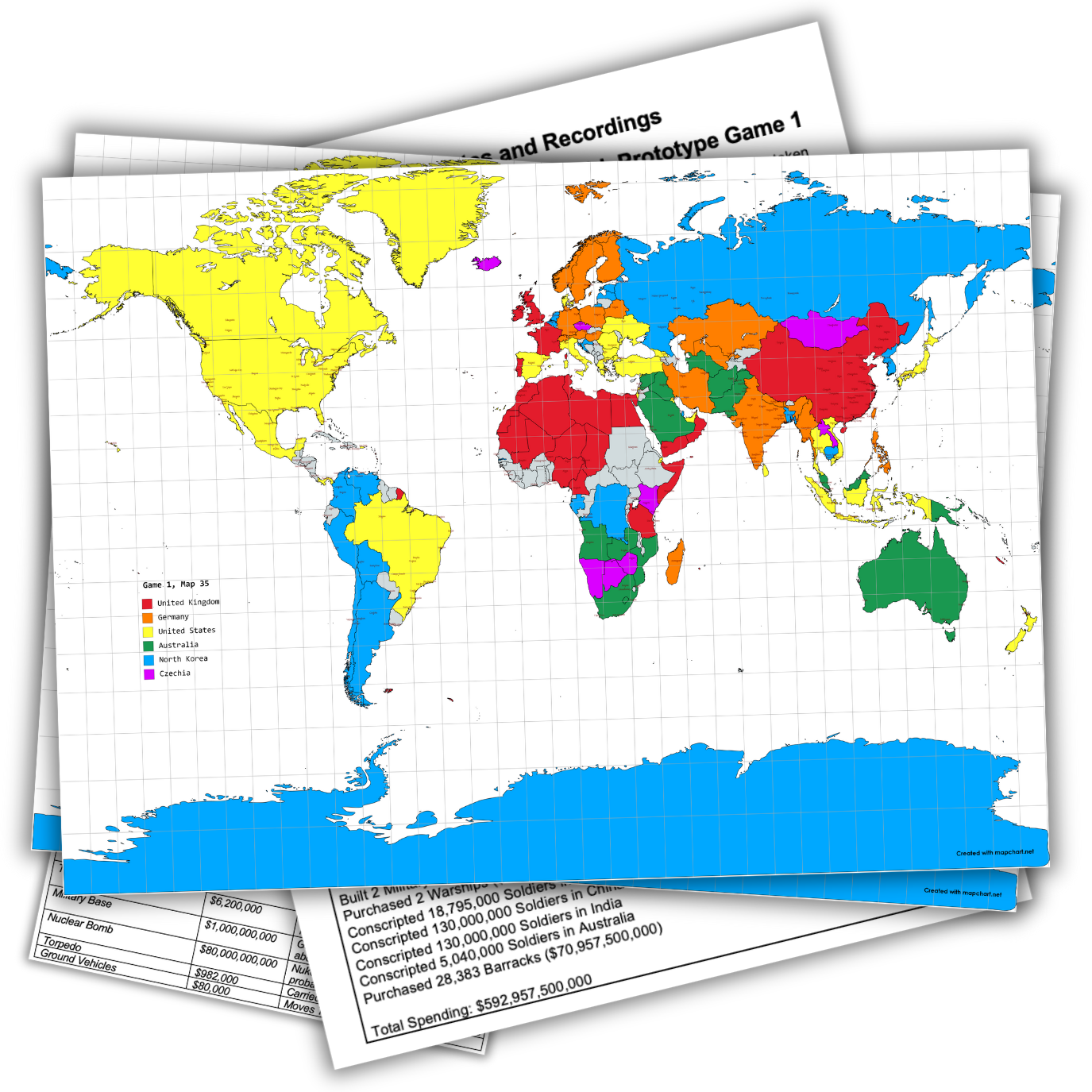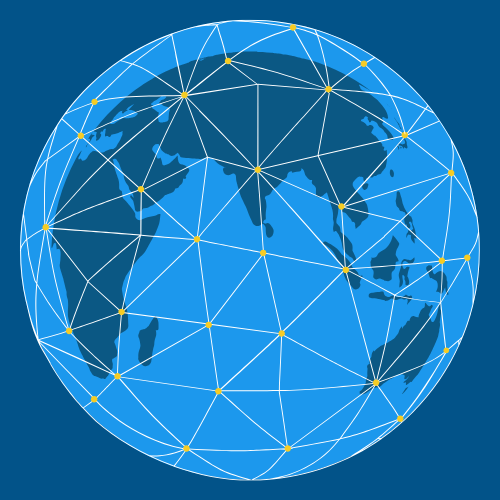About Global Nexus
Global Nexus is a worldbuilding strategy game built around power, consequence, and complex systems. Part political simulator, part economic model, and part military sandbox, it's a ruleset that asks: what happens when nothing is simple - and everything connects? Designed and refined over more than six years, it offers players not just a chance to play a nation, but to govern one - with all the chaos that might entail.
It began as a thought experiment: how far could a strategy game go before it broke? Originally nothing more than a map and a handful of loosely written notes, Global Nexus has grown into a sprawling system of interlinked mechanics - research trees, policies, crises, share markets, protests, sovereign wealth funds, land disputes, special actions, and so much more. Every mechanic has been tested, rewritten, and absorbed into the larger design. What's left is a game where every rule has a purpose, and every decision leaves a mark.

The Origin
It started in the back of a classroom, sometime in 2019 - a half-formed idea scribbled down quickly during the moment. A glance at a map, a few loose ideas for mechanics, and far too many countries for the number of players we had. It shouldn't have worked. But the idea just stuck.
The games we knew at the time weren't enough. Too simple. Too shallow. They lacked the weight of systems - the sense that politics, economics, diplomacy, and war weren't just themes, but actual mechanics. What if they could all collide in a single game - and actually function?
That was the question that never went away.
Through late 2019 and early 2020, the first version of the rules came together: rough, basic, and often rewritten on instinct. There was no real framework. No real ruleset - just guidelines pretending to be rules. No Measures of Society. No domestic systems. No policies or ideologies. Just nations, a blank map, some vague infrastructure, and the simplest war rules we could come up with.
It was called Campaign for the Entire God Damn World. Or, more affectionately, just Campaign. Against all odds - it was playable, and that was enough to get started.
The first full test game began in August 2020. It was chaotic, unbalanced, and barely held together - but it proved the concept. Despite its flaws, it showed that a geopolitical sandbox driven by real decisions, real stakes, and real complexity was not only possible, but compelling.
From that point, the project had momentum, and it never really stopped.
What Makes Global Nexus Different?
Most strategy games ask players to choose between combat, diplomacy, or economic. Global Nexus asks why you can't do all three?
At its core, Global Nexus is a living, evolving geopolitical simulator, working to blend war, politics, economics, diplomacy, espionage, development, ideology, public opinion, infrastructure, and more into a unified system. Players don't just move units or roll dice. They govern nations. They negotiate treaties, collapse economies, rig elections, stage coups, tackle black markets, build megaprojects, and try to outmanoeuvre both enemies and allies, all which managing internal pressures and global consequences.
Unlike many strategy turns, there are no turns. The world doesn't wait for you. Decisions happen in real time, and actions have layered consequences. A new tax policy could swing an election or a failed research project might cripple the military. An assassination attempt could spark a regional war (or prevent one).
There are no fixed win conditions. No one path to victory. No single "right" way to play. Players and nations define their own goals and are not judged be a scoreboard, but by the legacies they leave behind. What happens to your nation - or the world - depends entirely on what you do and the decisions you make.
How It Grew
From that first chaotic test in August 2020, Campaign for the Entire God Damn World (as it was then called) began to evolve - slowly, then suddenly.
Those early games were held together with duct tape and instinct: loose war rules, ambiguous diplomacy mechanics, and a near-total absence of domestic governance. But each test exposed cracks. Each failure pushed the system to grow. Over time, what started as a simple conquest game began to ask harder questions - not just what nations do, but why they do it, how it's justified, and what the consequences are.
By 2021, the full rewrite was underway. Basic economic functions became more complex. War rules became layerered. The idea of "Measures of Society" began to emerge - turning abstract traits like innovation, morale, and stability into quantifiable mechanics that players and nations could shape, degrade, or weapons.
Then came policies. Civil systems. Political frameworks. Research trees. Trade rules. Share markets. Central banks. Special actions. Espionage missions. Crisis responses. Laws. Characters. Emergencies. Elections. Ideologies. All built, scrapped, and rebuilt - not just to create depth, but to make every action feel political, intentional, and risky.
And with every major rewrite through 2020-2022 came a new test game. Some broke the system (or their players). Others reshaped it. But each one taught something new about balance, power, player behaviour, and the limits of the game's complexity.
There was never a single breakthrough - just hundreds of them, layered one after another until something began to feel real.
Where It Stands Now
Today, Global Nexus is no longer just a ruleset. It's a living framework built to simulate nations not as tokens on a board, but as a full political, social, economic, and military entities. It is the culmination of years of testing, rewriting, failures, and breakthroughs, but also of questions that never stopped being asked.
The game doesn't just track wars - it tracks ideology, propaganda, crisis response, economic collapse, cultural decay, judicial rulings, protest movements, intelligence operations, political scandal, and much, much more. It models the mechanics behind power: how it is used, who gets it, and what happens when it slips.
And while it's still growing, constantly being refined, expanded, stress-tested, and reworked, the foundation now is more solid than ever. It has become a platform: a base system adaptable to custom settings, regional spinoffs, experimental mechanics, and longform roleplay. It has evolved into a world where diplomacy, war, and policy don't just exist side-by-side, but where they define and challenge each other, and it has become a small but serious community of people who haven't just played the game, but shaped it.
It's not finished, and maybe it never will be. But it (mostly) works, and for the first time it feels as though this world can finally stand on its own.
